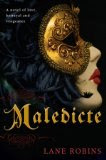The Graveyard Book by Neil Gaiman 320pp (Paperback) My Rating: 9/10 Amazon Rating: 5/5 LibraryThing Rating: 4.51/5 Goodreads Rating: 4.44/5 | ||
The story begins with a murderer, climbing the stairs with a knife, in search of his final victim - a mere toddler. (Believe me, it really is charming.) Having just killed the other members of the child's family, the man peers into the crib and prepares to complete his mission only to discover the figure he saw was a teddy bear instead of the child. The young boy, ingrained with a curious nature and a love for climbing out of his crib, was awakened by the commotion and crawled out of his room and house to the nearby graveyard. He is soon followed by his would-be killer, who is prevented from carrying out his plan when Mr. and Mrs. Owens, two ghosts who never had a child of their own, adopt the boy as their own and protect him. The child is named Nobody (Bod for short) and given the Freedom of the Graveyard. Since the ghosts cannot leave their burial place, the mysterious man Silas who is neither alive nor dead is appointed Bod's guardian to ensure he has the necessities. Bod grows up among the denizens of the cemetery and learns about what it means to be alive (and dead) from them.
The Graveyard Book is a fairly quick read, around 300 pages long with quite a few lovely illustrations (I have the edition by Dave McKean). It contains eight chapters and one interlude and each section seems like a short story. This does not mean there is no overall conclusion to the story or that characters introduced in a chapter are no longer referenced later. It does mean that each chapter tends to focus on one main storyline with a beginning, middle, and end that keeps them feeling self-contained even though they are part of a larger story. Even though I'm not normally a fan of short fiction, I thought this format worked really well since it made it easy to read a chapter before going to sleep and then pick up where you left off later. Yet I still had difficulty putting this one down when I should have been sleeping because it was absorbing.
A book beginning with the near-murder of a one and a half year old child and the actual murder of the rest of his family may sound rather dreary. To an extent it is dark, but most of Bod's story is lighter than this even though most of the other characters are deceased. There are chilling moments but there are touching ones and humorous ones as well. The pacing is excellent since there is never a dull moment even though it is not always "fast-paced" since part of the focus is on friendship and growing up instead of just on learning about the graveyard and its inhabitants.
The only character who is developed is Bod, the main character and the only one who is really qualifies as a primary presence in the story. He has a naturally inquisitive nature that can make his conversations a lot of fun to read about, such as when he met a living child whose father unfortunately taught particle physics, a field in which too many wanted to teach and too few wanted to learn.
"What's particle physics?" asked Bod.The Graveyard Book is fantastic storytelling containing both humor and seriousness, fantasy and reality. There is something to love for readers of all ages. Highly recommended.
Scarlett shrugged. "Well," she said. "There's atoms, which is things that is too small too see, that's what we're all made of. And there's things that's smaller than atoms, and that's particle physics."
Bod nodded and decided that Scarlett's father was probably interested in imaginary things.
9/10















